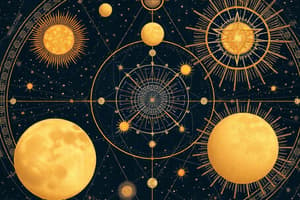Podcast
Questions and Answers
What is a star primarily composed of?
What is a star primarily composed of?
- Gas
- Solid
- Liquid
- Plasma (correct)
Which object orbits a planet?
Which object orbits a planet?
- A comet
- A galaxy
- An asteroid
- A moon (correct)
What is the typical composition of an asteroid?
What is the typical composition of an asteroid?
- Rocky (correct)
- Icy
- Gaseous
- Liquid
Which celestial body is characterized by being icy?
Which celestial body is characterized by being icy?
What does the term 'solar system' refer to?
What does the term 'solar system' refer to?
What is the function of a nebula in space?
What is the function of a nebula in space?
What is the significance of the zenith point in the sky?
What is the significance of the zenith point in the sky?
Why do some stars never set and are called circumpolar stars?
Why do some stars never set and are called circumpolar stars?
During which celestial event does the sun shine equally on both hemispheres of the Earth?
During which celestial event does the sun shine equally on both hemispheres of the Earth?
How many phases does the moon have in its complete cycle?
How many phases does the moon have in its complete cycle?
In what way do Kepler's laws of planetary motion contribute to understanding orbits?
In what way do Kepler's laws of planetary motion contribute to understanding orbits?
What is Occam's razor principle used for in scientific reasoning?
What is Occam's razor principle used for in scientific reasoning?
Flashcards are hidden until you start studying
Study Notes
Celestial Bodies
- A star is primarily composed of hot, glowing gas.
- A moon is an object that orbits a planet.
Asteroids
- Asteroids are typically composed of rock and metal.
Icy Celestial Bodies
- Comets and Kuiper belt objects are characterized by being icy.
Solar System
- The term 'solar system' refers to a collection of celestial objects that orbit around a star, including planets, dwarf planets, asteroids, comets, and other objects.
Nebulae
- A nebula is a cloud of gas and dust in space that can give birth to new stars.
Astronomy
- The zenith point is the highest point in the sky directly above an observer.
- Circumpolar stars are stars that never set and are always visible from a particular location on Earth due to the Earth's rotation.
- During the equinoxes, the sun shines equally on both hemispheres of the Earth.
Lunar Phases
- The moon has eight distinct phases in its complete cycle: new moon, waxing crescent, first quarter, waxing gibbous, full moon, waning gibbous, last quarter, and waning crescent.
Planetary Motion
- Kepler's laws of planetary motion contribute to understanding orbits by describing the paths of planets as elliptical, the speed of planets as varying, and the paths of planets as related to their distance from the sun.
Scientific Reasoning
- Occam's razor principle is used to choose the simplest explanation from multiple competing hypotheses, as it is the most plausible and requires the fewest assumptions.
Studying That Suits You
Use AI to generate personalized quizzes and flashcards to suit your learning preferences.




